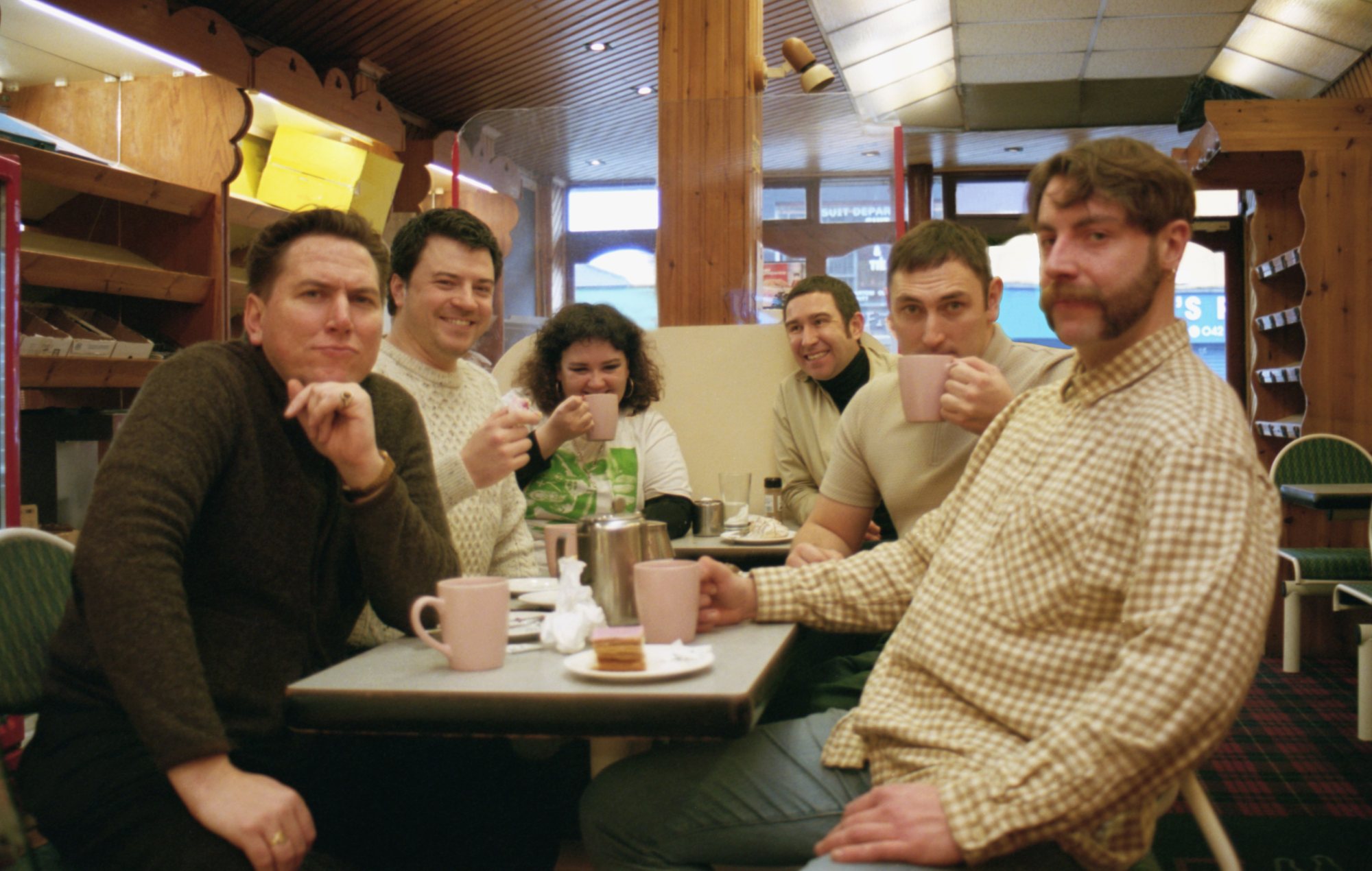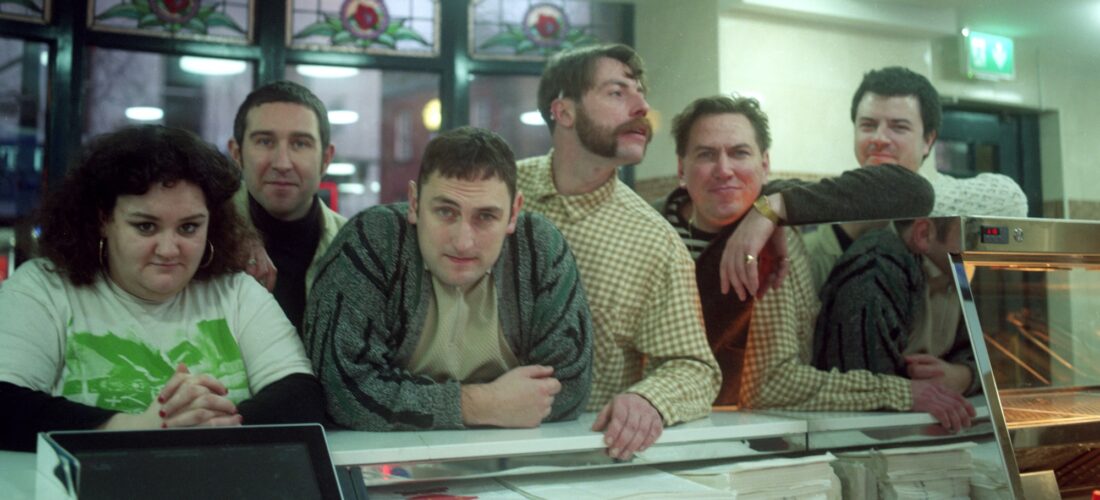The Mary Wallopers: “There needs to be a voice that’s giving the rowdy side of folk back to people”
Anyone who thinks folk music is nothing but a relic of the past doesn’t know much about The Mary Wallopers. In just a few years, the group have amassed an international following with their rambunctiously spirited interpretations of the Irish songs of yesteryear, injecting a thrillingly contemporary political zeal into a songbook that was dying to be dragged into the 21st century.
The band, led by brothers Charles and Andrew Hendy, first gained attention through a series of raucous pandemic-era live streams. Since then, their two albums to date – 2022’s self-titled debut and last year’s ‘Irish Rock N Roll’ – have used sometimes centuries-old songs to tell a story of inequality and class warfare that hits a resonant note today.
Alongside Fontaines D.C., The Murder Capital, Gilla Band and Lankum, the group are proving that Irish music is in the middle of a boom period. Now, The Mary Wallopers’ hard-earned success will be highlighted on an extensive world tour, taking in the UK, Europe, North America and Australia.
Before they leave their hometown of Dundalk to hit the road for those shows, NME caught up with the Hendy brothers to reflect on their rapid rise, why they think their style is eliciting a reaction from a new generation, and their incendiary Later with… Jools Holland performance alongside The Pogues’ Spider Stacy.
[embedded content]
You’re about to head on a huge world tour. As the gigs get bigger, do you see the crowds changing?
Andrew Hendy: “I think just so many different people listen to us – older people can reminisce over the old folk songs and listen intently, and younger people like us because they’re hearing it for the first time, and the young lads are hopping around with their tops off. So it’s a melting pot of people, but they’re all welcome.”
You made a splash with your COVID-era live streams. But how do we get from those to this? It’s quite a leap.
Charlie Hendy: “In fairness, it’s basically just playing gigs all the time. We have religiously played gigs, and we have not stopped for, I’d say, about four years.”
Andrew: “And generally speaking, our fanbase has spread through word of mouth from people who’ve gone to our gigs. It’s good because there’s no artificial hype – anyone who likes us has either seen us or knows someone that’s seen us.”
Charlie: “We’re not industry plants – no one would want to plant us in the industry.”
Andrew: “We’re industry weeds.”
Whatever you’re doing is working because it’s resonating with people. Your music is a high-energy way of expressing something that otherwise would be expressed through sorrow and with a heavy heart.
Charlie: “Yeah, absolutely. Folk got this name of being very meek or timid – kind of milquetoast. It became safe, and we hate that because that’s not what folk songs are about.”
Andrew: “It’s too candlelit.”
Charlie: “Yeah, it’s all fucking candles and tweed. The songs are all about fucking and drinking and hanging landlords and fucking murdering the cunts. They’re political songs, and even the love songs can be gruesome. You know what I mean?”
Andrew: “There needs to be a voice that’s giving the rowdy side of folk back to people.”
Charlie: “Even our slower songs are still raw because it’s us singing them.”
People out there are struggling, so having a way to express that frustration that’s actually made out of positive energy – I think that’s probably why people are into what you’re doing.
Charlie: “It’s what folk music is there for. Woody Guthrie said that, and you know, it’s the blues, it’s punk, it’s hip-hop. It’s an expression of people who are not totally satisfied with the deal they’ve got in life and who can see that it’s not fair. The world is not fair and it’s not fair because people don’t want it to be fair. You know, politicians and fucking rich cunts, they’re all fucking bastards. They should all be actually killed.
“Rishi Sunak – he’s a bastard. What did he say the other day? All these people that say Britain has been on the wrong side of history, he said, ‘Well, you know, no country is perfect’. Piece of shit. We need to get the people who don’t want to be in power and get them and put them in power because it’s not working the way it is.”
At the moment, you’re mostly doing traditional songs – although you do write your own songs as well. How does the act of cultivating and collecting these songs work?
Andrew: “I think the entry for us to Irish songs is hearing some of our siblings singing them and listening to The Clancy Brothers and The Dubliners as kids. Just being Irish, we were always surrounded by Irish music anyway because it’s everywhere. We’re lucky that instead of keeping our folk tradition in art centres, Ireland has turned its music into a recreational activity. So, most people in Ireland can either sing a song or, even if they’re not musical, they have a party piece. Even just a joke or a funny story. We have that culture. I think it’s why there’s so many great Irish artists in general, because just being Irish we grow up being surrounded by it.”

You set Later with… Jools Holland alight on New Year’s Eve. You played with The Pogues’ Spider Stacy just a few days after Shane MacGowan’s funeral – what are your memories of that?
Charlie: “The first day we went in for a rehearsal, the second day we snuck a load of cans of Guinness in and beer got fucking pissed. It was great craic. They had prosecco; normally, I wouldn’t drink prosecco, but I did that day. It was great to hang out with Spider and Louise, his partner. They’re fucking legends. So, we got to hang out with them for two days, and they’re great fucking people.”
Do The Pogues mean a lot to you guys?
Charlie: “No, I fucking hate The Pogues, they’re shit… No, only joking, of course we fucking love them. When we were listening to all these fucking English punk bands being like, ‘God save the queen’, like that was great, but when we heard Irish punk music that made it fucking way cooler. They made it cool to be Irish.”
Andrew: “Every so often, a band comes along and kicks Irish music up the arse, and The Pogues did that. The Dubliners did that, and they’re all in the same lineage. They’re amazing. And obviously, Shane MacGowan is a fucking deadly singer.”
Charlie: “His songwriting is unmatched.”
It feels like there are a lot of Irish musicians out there that are giving Irish music a kick up the arse at the moment.
Charlie: “There is seriously good Irish music out there. Our favourite artist is Jinx Lennon, who’s from Dundalk. He’s been going for years and he’s still releasing some of the best music I’ve ever heard in my life. And Lankum are unreal, and Just Mustard from Dundalk as well, we’re good friends with them. Kneecap are fucking unbelievable. It’s a great time for Irish music, yeah.
Is there something you can point to as to why that’s happening suddenly now?
Charlie: “Ireland has always been a good place for music, but a lot of the music that came out of Ireland previously didn’t really sound very Irish. You know, even if it was rock music or hip hop or anything, it didn’t sound Irish. It was emulating other countries.”
Andrew: “But now the younger generations are more proud to be Irish.”
Charlie: “Yeah, learning about the reality of the famine and all, and how it was a genocide, and then the British Empire and then the Catholic Church. [In] the history of our country, we’re kind of taught to hate ourselves as a people, but with the internet and the more information that’s coming out, the younger generations aren’t so ashamed to be Irish.”
Andrew: “There’s a lot more confidence in Irish culture, realising that our culture is fucking amazing.”
The Mary Wallopers are on tour in the UK in March and throughout the summer
